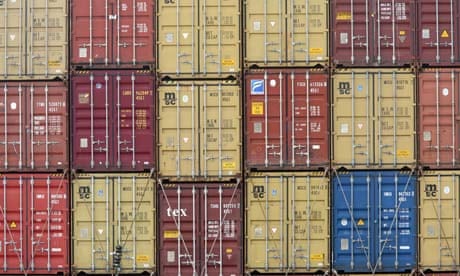Hsueh Sheng Wang was 13 when he arrived in France. Since then he has prospered, with business interests in food, clothing and property. A model for the Chinese community, he is in the process of buying part of the port at Le Havre in Normandy. Wang, 45, has plans for his company, Eurasia, to renovate dock warehouses covering 15 hectares and turn them into an import-export centre trading between France and China, a scheme on a par with the huge logistics platform that will soon be opening at Piraeus in Greece.
As he likes France, he wants to invest here, Wang says. He takes great care when he speaks French, holding back his naturally quick tongue, and says he reads Le Monde and Le Figaro, unlike most of his compatriots, who prefer Chinese papers.
He signed a preliminary purchase agreement in Le Havre last December and plans to invest $31m in the project. Work should start in September. The scheme is part of a pattern unfolding worldwide. "The Chinese want to do the distribution and marketing themselves," says Hervé Cornède, the sales manager at the port.
The rundown warehouses Wang is taking over are ideally placed. With a wharf on one side, they are close to a motorway junction and will be soon be accessible to rail freight. The plan is to import cheap Chinese products and export French luxury goods: "Wine, perfume, haute couture, leather goods and so on." Wang has been working on the project for two years and there are drawings all over the big table in his gloomy Paris office.
He is proud to be here, conscious that for many Chinese immigrants in France he is an inspiration, particularly for people from his home town of Wenzhou, 400km south of Shanghai. Many of them run small businesses, typically Chinese restaurants recently converted to sushi bars, bars or wholesale clothing stores.
That is how Wang started, just one of countless hardworking folk who landed here in the 1970s, often undocumented, following in the footsteps of the Vietnamese boat people. He, too, laboured day and night with his family to pay off the loans obtained from his fellows with only his good name as collateral. He, too, was determined to make good.
The progress of the Wang family was typical. Wang senior arrived first in 1973 and started work repairing furniture in Paris, his son explains. His mother and brother followed in 1976. "I was the last to arrive, in 1978," he adds. He was 13 at the time. After two years' apprenticeship he joined the rest of the family working in a restaurant managed by his father in Créteil, outside Paris.
In the 1980s, the family gave up the restaurant and switched to running a food shop. Then they moved north, to Lille, investing in the garment industry, in which they achieved spectacular growth. They started importing goods and by the mid-1990s were supplying leading chains such as Kiabi, Auchan, Pimkie and Foir'Fouille.
Having moved back to the Paris area and established a position as one of the biggest wholesalers in Aubervilliers, the Wangs started acquiring commercial premises. They would buy or rent properties, then divide them up and sublet them to smaller wholesalers, mostly Chinese. A handful of Chinese immigrants adopted more or less the same business model, particularly around Aubervilliers, which is one of the biggest trading centres for Chinese goods in Europe. However, Wang's business is now large enough – turning over $22m in 2010 – for him to operate outside these traditional networks.
Many think that his success is partly due to his love of France and an openness unusual in a businessman with his background. The Wang style also contributes to his success with the Chinese community in France. "He has all the characteristics of a Chinese but he is not like the others," says an enthusiastic Tamara Lui, a writer based in Paris working for the Sing Tao [Hong Kong] daily. "In a way we are all looking for the Wang in ourselves," she adds, referring to the anxiety of many Franco-Chinese, torn between their longing for success and integration and their reluctance to lose their original culture, particularly their language.
However, many of his competitors are not so happy about his attitude. Although he devotes time to many Chinese organisations, as is generally expected of a man in his position, he has never accepted any form of public responsibility. "No time," he says. But in the eyes of the Chinese community a man should never forget that success is also achieved through collective solidarity.
For example, Wang is not a favourite with the network surrounding the former French prime minister Jean-Pierre Raffarin, which exerts a certain influence on Franco-Chinese relations. "He is a Frenchified Chinese," says Alain Destrem, the conservative MP for the 15th arrondissement of Paris and head of the Club Europe-Chine Co-opération (ECC). "He has lost his community spirit."
It turns out that the ECC supports one of Wang's long-standing rivals, Wu Zhong, a businessman with a very similar career, who has been in France since 1994. Zhong is 42, almost the same age, and boasts the same initial backer, Li Yuping, a Chinese tycoon who still owns a symbolic share in Wang's company. Zhong's French is a little hesitant and his overall approach is more conventional, which is apparently more to Destrem's liking.
According to Ling Lenzi, 42, one of Wang's closest business acquaintances, his distrust of the Wenzhouese community may be his only serious shortcoming. Even now he still manages his little empire with a workforce of fewer than 20 people, and he alone stands as guarantee for all his acquisitions. But she is sure of at least one key achievement: Wang is "no longer just a Chinese shopkeeper".
This story originally appeared in Le Monde
